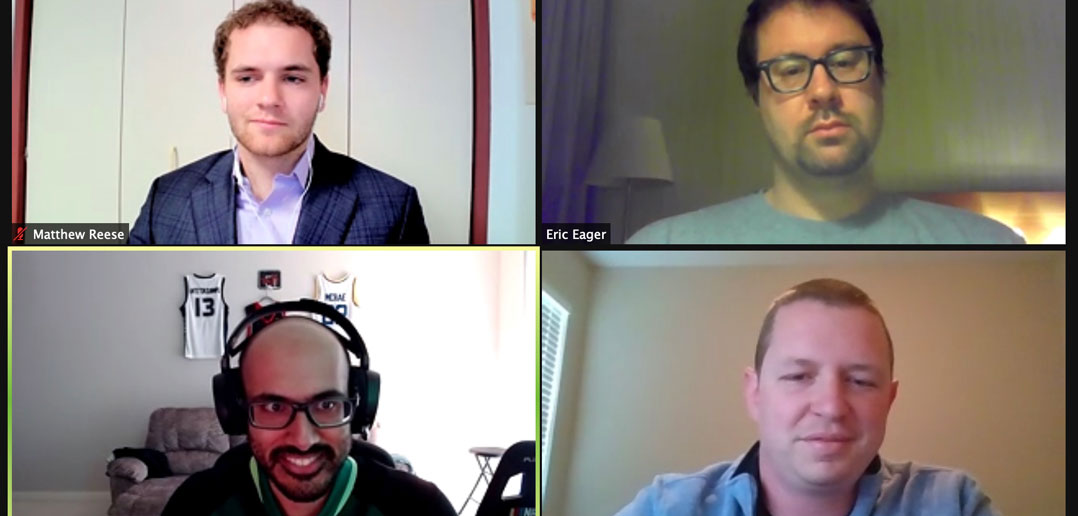“We’re celebrating this anniversary with a dynamic and timely program,” said Mark Conrad, associate professor of law and ethics at the Gabelli School. “We began 10 years ago in a very small room, and now we’ve been on Zoom the last two years and we draw present students, alumni, and guest speakers from all over the country.”
The event featured several Fordham graduates working in sports business fields. Conrad also announced the launch of a new Gabelli Sports Business Initiative, which aims to bring sports professionals together to discuss these cutting-edge topics.
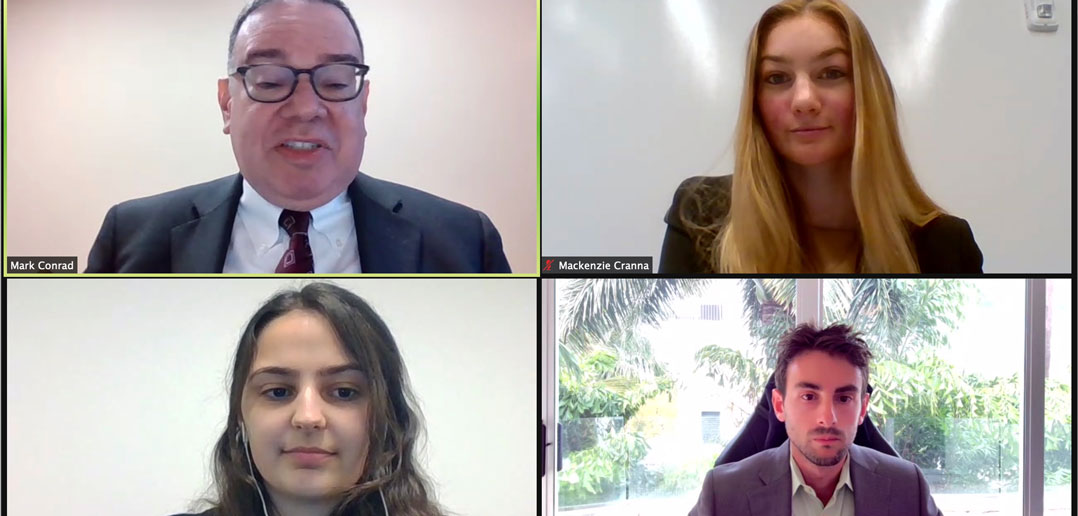
Name, Image, and Likeness for College Athletes
After California and Florida passed laws allowing college athletes to sign sponsorship deals and earn money for the use of their name, image, and likeness—and after the Supreme Court issued a 9-0 ruling in a related case—the NCAA began allowing students across the country to do the same thing.
Keynote speaker attorney Darren Heitner, the founder of Heitner Legal, P.L.L.C., and adjunct professor of Sports Law at the University of Florida Levin College of Law, helped write the name, image, and likeness law that passed in Florida. While Heitner often works on deals with high-profile college athletes, this year, he noted that other athletes have been able to take advantage of their moments.
St. Peter’s Doug Edert: A Win-Win Deal
“When St. Peter’s had its amazing run, and everyone was talking about Doug Edert, Buffalo Wild Wings did a deal with him,” Heitner said. “It’s funny that he could not have received it prior to July 1 and I don’t think we’re gonna be talking about Doug for the foreseeable future—I don’t think he’s going to have a career in the NBA, yet it was a win-win for both sides.”
Conrad asked Heitner if in the future he thought student-athletes would try to take this a step further and work to get a contract with their university, essentially becoming employees of the institution. Heitner said he wasn’t sure if that was the best thing for them.
“I wonder whether it opens up a can of worms for athletes,” he said, noting that this could lead to questions, such as whether they were considered at-will employees. “I do think we are getting closer to an ecosystem where athletes are sharing in the revenues of their universities or perhaps the conferences.”
Diving Deeper into Analytics for ‘Smarter’ Fans
Sanjay Pothula, a research and innovation analyst with the Milwaukee Bucks who graduated from the Gabelli School of Business in 2015, said that he tries to stay on top of the latest in analytics by looking at sports other than basketball.
“I’ll try to see—are there ways that people are thinking about things differently? Because a lot of times, when you’re looking at your analysis in your own sport, sometimes … everyone has the same ideas about a similar topic,” he said. “And sometimes you just want to kind of get out of that and see ‘is there a new way to think about things?’”
Pothula said that Fordham helped connect him to internships in sports that gave him experience for his career.
“The great thing about Fordham was that there were a lot of people in different sports,” he said. “There especially were a lot of connections in baseball—(being) part of the Business of Sports Society at that time…it kind of gave me a realization of what I can do and what opportunities were out there.”
Pothula was on a panel with Caleb Shreve, the head of analytics for Orlando Soccer Club, and Eric Eager, vice president of research and development at Pro Football Focus, a sports analytics company that focuses on the NFL and NCAA football. Eager said that his company has had to adapt to a changing market of not just serving the teams and media, but also serving the fans who want detailed data analytics.
“It’s undeniable to me that the average sports fan and the average person who works in sports is just a lot smarter than they were 10 years ago,” he said. “You have fantasy football, sports betting, which is exploding—the average consumer of the game just has skin in the game more often than they did before, and they’re getting smarter.”
Using Influencer Content on Social Media
Emily Martin, manager of paid social marketing for the NBA and a 2018 graduate of the Gabelli School of Business, said that in her role she has to stay on top of the latest trends and ways people connect on the different social media platforms. For example, TikTok in particular, has a different style than previous social platforms.
“You really have to be more native in the platform because the users are highly sensitive to any sponsored content or anything that looks fake or inorganic,” she said in a panel discussion that also included Douglas Bennett, a senior manager of partnership marketing for NYCFC who and received his master’s in strategic marketing communications from the Gabelli School in 2020.
“So a strategy that we’re trying to utilize there is rather than using our paid content, which is huge, the best way is to try to get some influencers involved and boost stuff that has already been posted organically.”
Martin said that Fordham helped her take what she learned and put it into practice.
“I think that Fordham does a great job of really giving that hands-on experience,” she said. “To be able to really take in other sports marketing classes and business it helps you really develop that interest. And then, of course, the club and the concentrations really encourage you to get out there, get a sports internship.”
]]>Listen here:
And in this bonus track, we ask Conrad: Which is the best sports league, and which is the worst?
Full transcript below
Mark Conrad: Sports is an entertainment business. An entertainment business is a talent-driven business. Ask just about any sports executive to sum up the sports business, and they say that.
Patrick Verel: The professional sports market in the United States was worth about $60 billion in 2014. And according to Forbes, it’s expected to reach $73 billion by 2019. Chump change it most certainly is not. I’m Patrick Verel. And today, my guest is Mark Conrad, Director of the Sports Business Concentration at Fordham’s Gabelli School of Business.
This is the first year that Chief Wahoo was absent from the Cleveland Indians uniform. But fans will still be able to buy merchandise with his image at the team’s gift shop. What do you think? Smart move or just delaying the inevitable?
Mark Conrad: Well, it is delaying the inevitable in a certain sense because you’ve seen a gradual transition away from that symbol that was seen on the uniforms in other kinds of stadium type functions. And certainly in the media, you’ve not seen it as you used to see it either, which is a fortunate thing because Native American groups have demonstrated for years against that symbol and the depiction that the symbol seems to infer about Native Americans. And according to them, it was quite offensive. So I think this was a nice or a diplomatic way to segue away from the use of that particular logo. And I suspect in the next few years, it’ll be eliminated entirely. So right now, it can only be sold and bought in merchandise in the Cleveland area. Major League Baseball is not going to handle any merchandise nationwide with that particular symbol.
Patrick Verel: As of this recording, the NCAA’s March Madness is in full swing. And every year, there’s this talk about how athletes are being taken advantage of because they’re technically amateurs. Do you see any movement on this issue?
Mark Conrad: I think there is significant movement on this issue. And I think in the next two to three years, there’ll be more movement on this issue. This is the beginning of a revolution because we’re finally realizing that with all the revenues that the NCAA makes in its men’s basketball tournament, it is really ludicrous to consider these players, who are the labor force for this tournament, the labor force that doesn’t get compensated when the coaches do, the media people do. The television networks pay the NCAA huge rights fees to see that. Advertisers advertise on this, for this particular broadcast and series of broadcasts. So this is really something that is getting to be manifestly unfair because a labor force is paid basically nothing when you’re dealing with elite men’s college basketball.
There have been a number of cases in the courts that have challenged this arrangement on anti-trust grounds. And there’s been some liberalization regarding some of the student compensational ready. And also in the football area, the conferences seem to be taking over control over big time college football. And the NCAA has sort of surrendered that. And it’s surrendered that for many years. Just as an example of how ludicrous this can be is that the University of Central Florida denied eligibility to a student who had a YouTube page and he did various creative projects on YouTube and did get some advertising revenue, which had nothing to do with basketball. And he launched a First Amendment lawsuit against the University of Central Florida, which is a public institution, saying that it violates his free speech rights.
What I think would be the easiest thing to do is allow students to make endorsement deals, allow students to engage in outside activities that could be somewhat sports related. And if the University’s wish were to try to control the money, they could put it in a trust fund. So if the student spends X period of time or even not, X years later it would be available to the student. So let’s say the student really can get an endorsement deal, or the student wants to teach basketball to someone like me, and get paid for it, why shouldn’t the student do that?
A music student has every right to do gigs on the side while that person is a music student in a school. And I know many music students who’ve done that. So why can’t a student athlete do the same thing if indeed there is a market for that? On the other hand, I don’t think paying players outright as employees would be the way to go, simply because it could be very costly and university budgets, athletic budgets often lose money, and you have many other sports that don’t raise those revenues. And second, to treat someone like an employee is very different than treating them like a student athlete or a student. It would pose other kinds of legal issues.
Patrick Verel: Let’s talk a little bit about the NFL. There’s been a real increased awareness of concussion-related injuries. And that’s been leading to a decrease in boys playing tackle football in many parts of the country. Do you think the league’s viability could be affected by a shrinking pool of potential players in the future?
Mark Conrad: Well, the quality of play could and the nature of who the NFL teams could pick could be affected. I don’t foresee the NFL shutting down because the NFL could certainly get enough of a talent pool. Because ultimately, those players could be deemed as high risk, high reward. They are being compensated. In many cases, compensated quite well for what they do, albeit in a very, very short time because the average NFL player only plays about three seasons. And of course, we do know about the serious physical risks that NFL players endure by playing that sport. But I do think that the era of open doors for the NFL to millions of potential kids out there who play in the junior high school or high school level may be receding a little bit. The concussion issue has been a serious issue. Many families are worried about it. And seeing the media reports of these veteran players that many of us know and watched suffering greatly does have a very powerful effect.
Patrick Verel: The NFL has got other challenges to face to. Can you talk a little bit about that?
Mark Conrad: Well, where do we start? The NFL has a problem with its players and its players union. And I suspect there’s a good chance there will be some kind of concerted action after the end of the present collective bargaining agreement, which is a fancy term for either a strike or a lockout. I think that the players want to change the arbitration system that existed, that one could argue burned Tom Brady and others because it is very unusual that the Commissioner can be the arbitrator or the Commissioner can appoint somebody to be the arbitrator when many of us learn that arbitrators should be independent and have no conflict of interest. It’s a very, very bizarre system that came about. I think that the players are really going to want to change that. That’s one thing.
The second of course are the concussion protocols, which are really more for the veteran players. And the NFL settled a lawsuit by thousands of former players regarding medical care for their injuries that arguably resulted from concussions. And that’s been slow to get off the ground. There is a $1 billion fund over many, many years, but apparently it’s been a slow process, and we have to see how indeed that plays out.
Indeed, I think the issue of television rights will be something to watch because the NFL’s main TV deals are expiring in a few years. Although, the recent deal with Fox for Thursday night broadcast of $1 billion over five years is a pretty astounding deal, much higher than the prior deals. So certainly, there’s still broadcasters out there that are willing to pay big bucks for the NFL.
And finally, of course the political issues, the whole “Colin Kaepernick effect” has been controversial and some say has hurt ratings in the NFL, while other say that quality of play this season has hurt ratings in the NFL. I’m not here to judge one way or the other. But I think it cannot be good that a lot of people felt that the game got politicized. On the other hand, I would say that the President exacerbated the situation by bringing up the issue a number of times when indeed it seemed to fading. And I think it’s almost a normal human reaction to say, “Well, you attack us by saying that. Well, we may just continue doing this sort of thing.” But in the long run, it may not be good for anyone because I suspect that the goal that the kneeling issue has sought has already been passed. At this point, we understand the issues. And do you keep doing this or not? And I think that’s something that we’ll have to see what happens the next season.
Patrick Verel: Before we started recording this, we were talking a little bit about the NFL and how about five, six years ago, it seemed like the League was invincible. And you had said that when you teach the class on the subject that your syllabus is often out of date by the end of the semester. Is there something inherent about his business that’s so chaotic?
Mark Conrad: Sports is an entertainment business. An entertainment business is a talent-driven business. Ask just about any sports executive to sum up the sports business, and they’ll say that. It’s a talent-type business that has a lot of similarities to entertainment because you’re dealing with personal services. People are paying money to watch individuals perform. They’re not paying money to buy a chair. It’s a very different kind of arrangement. So in a sense, it’s very fluid because you’re dealing with human beings performing.
Second, it is very technologically-driven and changes in technology, as it is with entertainment, also involve sports. The delivery systems, content providers, dissemination of various kinds of benefits, technologies, become very, very important in sports because there’s a lot of money involved in that. So I suspect that’s also a reason why it’s so dynamic.
And three, there’s often a lot of law that goes into sports because the courts are very, very busy. This is an endeavor that’s followed by tens of millions of people. There’s great interest. And even something like the Supreme Court ruling that in effect sports gambling can be legalized in much of the country, which is possible, can have a big effect starting almost immediately as a number of states may pass laws that will allow sports gambling. At this point, only Nevada has open sports books. That is likely or may very well likely change.
And then you create a very new business. What about gambling at the arenas? How much money do the states take? How much money do the leagues take? Jobs for analytic specialists because gambling is based on analytics and probabilities. So you create a new industry overnight. Another major issue of course are drugs, PEDs, and all the international attention that’s occurred there, and the controversies going on as well as the trials involving FIFA executives or former FIFA executives, which may not end because there are a number of investigations going on regarding the governance of international sports federations. This is an area that is not going to get stale.
Bonus Track
Patrick Verel: From a business perspective, what’s the best run sports organization and what’s the worst run sports organization, in your opinion?
Mark Conrad: In terms of sports leagues, the best run league is the NBA. Under Commissioner Adam Silver, who’s done an amazing job making the owners happy, making the players happy. He handled the Donald Sterling situation, a few years back, brilliantly. And the NBA has a new television contract that’s something like two and a half times the old one. So, things are going really, really well for the NBA. I would say they are the best.
In terms of the worst, I think you have to look internationally. There’s so many bad ones, so many federations are a problematic, but I would simply say at this point, USA Gymnastics probably has the award at this point for what had happened, which is absolutely outrageous. The U.S. Olympic Committee is not on that category because they’ve done some good things, but certainly the lack of aggressive investigation and involvement in this sexual abuse matter is a cause of great concern.
]]>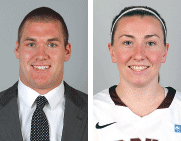
With seven teams honored, Fordham ranks third-highest among Atlantic 10 schools. Dayton and George Washington universities tied at nine teams. Richmond had eight teams.
In addition, Fordham has posted multi-year APR scores in the top 10 percent of all squads in their respective sports. It was recognized as one of 56 NCAA Division I programs, and one of three current Atlantic 10 schools, with one or more teams that have been recognized in each of the past nine years.
APRs for all Division I teams were released on May 14. Teams must meet a certain academic threshold to qualify for the postseason, and they also can face penalties for continued low academic performance.
Those Ram teams honored are baseball, golf, men’s swimming and diving, men’s indoor track and field, men’s outdoor track and field, women’s indoor track and field, and women’s tennis. Women’s indoor track and field and women’s tennis have both been honored in each of the nine years the NCAA has released the scores. Baseball is recognized for the seventh time; Men’s indoor and outdoor track and field programs are recognized for the fifth time, as is the men’s swimming & diving program.
“We are honored to be one of 56 NCAA Division I programs that have had a team honored in each of the nine years the NCAA has been compiling APR scores,” said Director of Athletics David Roach. “These student-athletes have demonstrated that they are as serious about their academic accomplishments as they are about their athletic success, and we are extremely proud of them as well as of their coaches and the academic support staff.”
The 1,049 teams publicly recognized for high achievement represent 631 women’s teams and 418 men’s or mixed squads. In 2013, 976 teams were recognized.
The public recognition awards are part of the broad Division I academic reform effort. The APR provides a real-time look at a team’s academic success each semester by tracking the academic progress of each individual student-athlete. The APR includes eligibility, retention, and graduation in the calculation.
The scores required to be in the top 10 ranged from 980 to a perfect 1,000, depending on the sport, with the majority of top 10 teams earning a perfect APR.
“Each year, more and more teams are achieving perfect APR scores,” said NCAA president Mark Emmert, adding that member schools are “providing tremendous opportunities for student-athletes” to succeed both on and off the field.
The NCAA honors are the latest academic awards earned by Fordham student-athletes. This year two student-athletes, Abigail Corning (women’s basketball) and Bret Biestek (football), were named Capital One Academic All-District, with Biestek going on to earn First Team Capital One Academic All-America® honors.
]]>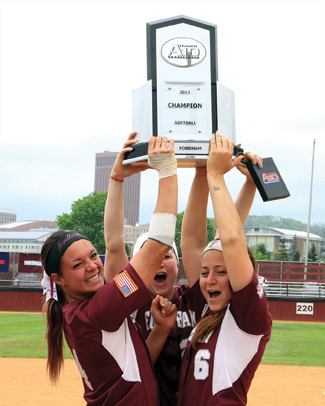
Photo by Tom Wasizcko
For the second time in three years, Fordham’s Softball team was named A-10 Champions following a stellar season. The team also registered its third NCAA Regional appearance in the past four years.
The Rams’ season came to an end when Fordham fell to Arkansas, 5-2, in game five of the Norman Regional on May 18.
In spite of their NCAA regional loss against Arkansas, the Fordham Rams, also the A-10 champions in 2011, raked in quite a few individual honors. Four players earned First Team NFCA Division I All-Region, as Michele Daubman, GSB ’15, Elise Fortier, FCRH ‘14, Gabby Luety, FCRH ’14 and Jamie LaBovick, GSB ’13 were recognized as some of the premier players in the Mid-Atlantic Region.
Fordham’s four First Team All-Region selections tie for the second most in school history, as the 2010 Rams garnered five First Team nods and the 2007 squad earned four spots on the All-Region Squad. All four of these players also garnered recognition from the Atlantic 10, as LaBovick made First Team All-Conference, Fortier and Luety earned Second Team and Daubman was named to the Academic All-Conference Team.
— Andrew O’Connell
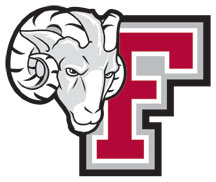 Catch up on all the sports news:
Catch up on all the sports news:
Season and individual ticket information is
available by calling the Fordham Ticket Office
at (718) 817-4300. A complete men’s and
women’s schedule can be found online at:
]]>
 If you’re watching the NCAA men’s basketball tournament, keep an ear open for a familiar Fordham voice.
If you’re watching the NCAA men’s basketball tournament, keep an ear open for a familiar Fordham voice.
Spero Dedes, FCRH ’01, the radio play-by-play announcer for the Los Angeles Lakers, will call four early-round games in the tournament’s Southwest region.
On Friday afternoon, Dedes, who got his start at WFUV (90.7 FM, wfuv.org ) will announce the Notre Dame- Akron game followed by the Texas A&M game against Florida State. Later that evening, Dedes will return to the air as the No. 14-seed Saint Peter’s Peacocks try to upset the No. 3-seed Purdue Boilermakers.
Dedes is also in line to finish a busy day behind the mic with the matchup between Georgetown and Virginia Commonwealth, who defeated USC in the tournament’s first round of play.
In 2001, Dedes received the inaugural Marty Glickman Award, given annually to the Fordham announcer who best exemplifies the standards set by the late sports broadcasting icon. Along with Bob Aherns, executive producer of WFUV sports, and John Cirillo, FCRH ’78, Spero credits Glickman for helping him perfect his craft.
Dedes is one of a long line of Fordham-trained sportscasters, including Mike Breen, FCRH ’83; Michael Kay, FCRH ’82; Bob Papa, FCRH ’86; and Ford C. Frick Award winner Vin Scully, FCRH ’49, the longtime voice of the Los Angeles Dodgers.
—Miles Doyle, FCRH ‘01
(Photo courtesy of the Los Angeles Lakers.)
Scoring leader Jio Fontan will direct a lethal mixture of returning vets and young talent when the men tip off against Maine on Nov. 13.
A month later, the team will venture outside the comfy confines of Rose Hill to clash with the powerhouse Villanova Wildcats—a Final Four team last year—under the bright lights of the Izod Center in East Rutherford, N.J.
That game will ready the Rams for yet another contest on the pro hardwood. On Jan. 13, Fordham will take on Atlantic 10 rival Dayton from Madison Square Garden. The game will mark the first Fordham appearance at the Garden since 2002, and the 114th overall.
Plus, the women’s squad is ready to show that the men don’t have a lock on hardwood heroics. A bumper crop of fresh talent will transform the team, which is built on the solid shooting and steady shoulders of veterans Randall Hurst and Becky Peters.
Make no mistake. Rams basketball is bearing down on the Rose Hill campus and professional arenas in and around New York City. Thousands of fans will come along for the ride.
Will you be there?
Now you can get in on all the jump shots, fast breaks and slam dunks of Fordham basketball by taking advantage of the most generous season ticket plan in the University’s history.
Here’s what you’ll get as a 2009-2010 basketball season ticket holder:
• the full season of men’s and women’s basketball tickets;
• a 50 percent discount off the walk-up ticket prices for all 12 home games;
• a ticket to the game against Villanova at the Izod Center;
• a guaranteed seat for popular home games against Xavier, St. Joseph’s and Dayton;
• a free media guide for loge season ticket holders ($10 value);
• first priority in tickets for the Atlantic 10 Championship Tournament;
• reduced-fee parking passes;
• first priority in tickets for the following basketball season.
With a season of Fordham hoops action available for only $110 (general admission; reserved seats are $135 for the season and loge seats are $165 for the season), there’s no need to wait for March to begin the madness!
Just take it from Athletic Director Frank McLaughlin:
“Both coaching staffs worked hard to recruit the outstanding young talent on these teams,” he said. “When alumni show their strong support, it sends a message to the basketball community and to potential student athletes that Fordham is setting its sights on becoming a first-class program.”
McLaughlin was an assistant coach when Fordham took on second-ranked Marquette University at Madison Square Garden during the 1970-1971 season. That year, the Rams went on to the NCAA tournament and finished with a 26-3 record under head coach Digger Phelps.
McLaughlin knows a frenzied crowd is integral to the team’s success.
You can be part of the excitement at the Izod Center, Madison Square Garden and every Fordham home game this season.
Be there when guard Brenton Butler nails a three-pointer against Villanova at the Izod Center.
Cheer when the women’s team retires the uniform number of all-time scoring and rebounding leader Anne Gregory on Dec. 5.
Scream yourself hoarse as Jio Fontan, a 2009 Atlantic 10 All-Rookie Team selection, helps the Rams climb the standings in the competitive Atlantic 10.
Do it because it’s not a game.
It’s basketball.
Be a Fordham Fanatic.
]]> Basketball Hall-of-Famer and television analyst Bill Walton will speak at the Fordham University men’s basketball Tip-Off Dinner on Nov. 6 at Tavern on the Green in Manhattan, the Department of Athletics announced on July 19.
Basketball Hall-of-Famer and television analyst Bill Walton will speak at the Fordham University men’s basketball Tip-Off Dinner on Nov. 6 at Tavern on the Green in Manhattan, the Department of Athletics announced on July 19.
The department also announced that the Rams will face the University of North Carolina at Charlotte, Duquesne University and Temple University twice during the 2007-2008 season, according to a revamped conference schedule. This will mark the third consecutive year that Fordham will have a home-and-home series with Duquesne while Charlotte and Temple replace the University of Rhode Island and St. Bonaventure University, which the Rams played twice during the 2006-2007 season.
Walton was part of two NCAA championship teams at UCLA in the 1970s and was selected three times as the NCAA Player of the Year. He also led the Portland Trailblazers to an NBA championship in 1977. Walton was inducted into the Basketball Hall of Fame in 1993, and became a member of the Academic All America Hall of Fame in 1994. He is currently an NBA analyst for ABC and ESPN, and won an Emmy in 2001 for best live sports television broadcast.
The annual dinner is open to Fordham alumni, family and friends. For more information, contact Ryan St. Germain, alumni relations officer for athletics, at (212) 636-6527, or via e-mail at [email protected].
]]>“Dave Clawson did a tremendous job at Fordham and has this program going in the right direction,” said Executive Director of Athletics Frank McLaughlin. “We wish Dave the best of luck in his new position.”
Clawson led the Rams to a 26-10 record over the past three years, 14th best in the NCAA I-AA. He guided the 2001 team to a 7-4 record, Fordham’s first winning season since moving to I-AA in 1989, and the 2002 squad to a 10-3 mark as the Rams won their first ever Patriot League title and advanced to the NCAA I-AA playoffs.
Offensive coordinator Ed Foley will serve as the interim head coach as a national search for Clawson’s successor will begin immediately.
]]>